Understanding legal fees for Divorce Lawyers in Ontario: Your Options
|
Service
|
Average Fee Range (2025)
|
Notes
|
|---|---|---|
|
Uncontested Divorce
|
$1,500 – $3,000
|
Basic document prep; low conflict.
|
|
Contested Divorce
|
$7,500 – $25,000
|
Negotiations; higher if trial.
|
|
Trial (2-4 Days)
|
$75,000 – $200,000
|
Urban centers; includes prep.
|
|
Separation Agreement (with Children)
|
$750 – $4,000
|
Flat fee common.
|
|
Child Custody/Support
|
$750 – $4,000
|
Mediation reduces this.
|
|
Motion to Change
|
$3,000 – $7,000
|
Up 114% since 2021. |
|
Retainer Fee
|
$1,000 – $10,000+
|
Varies by complexity.
|
Yes, court fees can be waived in certain cases if you are eligible for financial assistance programs.
If your household relies on income from government support programs like the Ontario Disability Support Program (ODSP) or Legal Aid, you may qualify for a waiver of the court filing fees.
Consider opting for an uncontested divorce, using mediation, or handling parts of the process yourself.
Minimizing disagreements and organizing your paperwork can reduce lawyer involvement and, therefore, lower costs. You can also explore flat-fee arrangements for specific services rather than paying an hourly rate.
An uncontested divorce usually takes 3 to 6 months, while contested cases can take years.
The duration of a divorce depends on whether both parties can agree on the terms. Contested divorces, which require court intervention, can drag on for several years and significantly increase costs.
Hidden costs may include third-party fees, such as appraisals, bailiff services, and expert witness fees.
In addition to court and legal fees, you may need to pay for property appraisals or serving divorce papers to your spouse. Lawyers may also charge extra for preparing child custody or spousal support agreements.
If you can’t afford a lawyer, you may qualify for Legal Aid Ontario.
Legal Aid provides financial assistance for low-income individuals. You can also explore payment plans, or handle some aspects of the divorce process yourself using a DIY divorce kit, which costs between $300 and $500.
Yes, mediation costs between $1,500 and $3,500, significantly lower than lawyer-led divorces.
Mediation can be a cost-effective option for resolving disputes without going to court. By facilitating mutual agreements, it often avoids the lengthy and expensive process of a contested divorce. However, a lawyer may still be needed to finalize the paperwork.
No, court fees are separate and range from $200 to $500 in Ontario.
Court filing fees are mandatory expenses, payable in installments. For example, the filing fee for a simple divorce in Ontario is $669, paid in two parts. If additional motions are needed, more fees will be incurred.
A contested divorce can cost anywhere from $7,500 to $25,000 or more.
The complexity of the case, the number of court hearings, and unresolved issues like custody or spousal support drive up the costs. If the case goes to trial, fees can reach as high as $50,000, making contested divorces substantially more expensive than uncontested ones.
An uncontested divorce is the cheapest option, costing between $1,500 and $3,000.
Uncontested divorces involve both parties agreeing on all major issues, which reduces the need for extended legal services. Filing fees and document preparation are the primary costs, but additional legal fees are minimal since no courtroom battles are necessary.
Most divorce lawyers in Ontario charge between $300 and $600 per hour.
The total cost depends on the complexity of your case, the lawyer’s experience, and how contested the divorce is. Contested divorces can cost significantly more, especially if they involve child custody, spousal support, or property division. You may also need to pay a retainer fee upfront, typically between $5,000 and $10,000.
Ken Maynard CDFA, Acc.FM
I assist intelligent and successful couples in navigating the Divorce Industrial Complex by crafting rapid, custom separation agreements that pave the way for a smooth transition towards a secure future. This efficient process is achieved in about four meetings, effectively sidestepping the excessive conflicts, confusion, and costs commonly linked to legal proceedings. Clients have the flexibility to collaborate with me either via video conference or in-person through a DTSW associate at any of our six Greater Toronto mediation centers, located in Aurora, Barrie, North York, Vaughan, Mississauga, and Scarborough.
















































